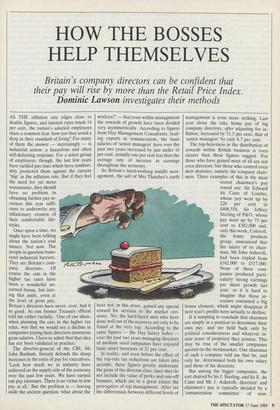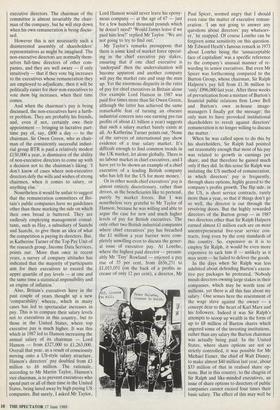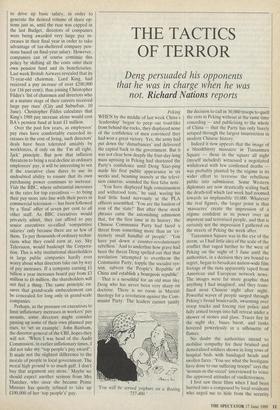HOW THE BOSSES HELP THEMSELVES
Britain's company directors can be confident that their pay will rise by more than the Retail Price Index.
Dominic Lawson investigates their methods AS THE inflation rate edges close to double figures, and interest rates touch 14 per cent, the nation's salaried employees share a common fear: how can they avoid a drop in their standard of living? For many of them the answer — increasingly — is industrial action: a hazardous and often self-defeating response. For a select group of employees, though, the last few years have yielded pay rises which have comfort- ably protected them against the current `blip' in the inflation rate. But if they feel the need for yet more reassurance, they should have no problem in obtaining further pay in- creases this year suffi- cient to underwrite any inflationary erosion of their comfortable life- styles.
The director-general of the CBI, Mr John Banham, fiercely defends the sharp increases in the rates of pay for executives: `Look how much we in industry have achieved on the supply side of the economy over the past few years. We have earned our pay increases. There is no virtue in low pay at all.' But the problem is — leaving aside the ancient question 'what about the workers?' — that even within management the rewards of growth have been divided very asymmetrically. According to figures from Hay Management Consultants, lead- ing experts in remuneration, the basic salaries of 'senior managers' have over the past two years increased by just under 16 per cent, actually one per cent less than the average rate of increase in earnings throughout the economy.
So Britain's hard-working middle man- agement, the salt of Mrs Thatcher's earth have not, in this sense, gained any special reward for services to the market eco- nomy. No, the hard-faced men who have done well out of the recovery are only to be found at the very top. According to the same figures — the Hay Salary Index over the past two years managing directors of medium sized companies have enjoyed basic salary increases of 32 per cent.
In reality, and even before the effect of the top-rate tax reductions are taken into account, these figures greatly understate the gains of the director class, since they do not include the value of perks and one-off bonuses, which are to a great extent the prerogative of top management. After tax the differentials between different levels of management is even more striking. Last year alone the take home pay of big company directors, after adjusting for in- flation, increased by 31.5 per cent, that of 'senior managers' by only 4.7 per cent.
It is tempting to conclude that chairmen are simply in a position to determine their own pay, and are held back only by political considerations and whatever in- nate sense of propriety they possess. This may be true of the smaller companies quoted on the stockmarket. One chairman of such a company told me that he, and only he, determined both his own salary and those of his directors.
But among the bigger companies, the sort chaired by Sir J. Sterling, and Sir E. du Cann and Mr J. Ashcroft, directors' and chairmen's pay is typically decided by a 'remuneration committee' of non- executive directors. The chairman of the committee is almost invariably the chair- man of the company, but he will step down when his own remuneration is being discus- sed.
However this is not necessarily such a disinterested assembly of shareholders' representatives as might be imagined. The non-executive directors are normally them- selves full-time directors of other com- panies, and they are well aware — if only intuitively — that if they vote big increases to the executives whose remuneration they are employed to adjudicate, then it will be politically easier for their non-executives to vote them big increases, when their time comes.
And when the chairman's pay is being discussed, the non-executives have a furth- er problem. They are probably his friends, and, even if not, certainly owe their appointment — bringing in lucrative part- time pay of, say, £800 a day — to the chairman. Sir Owen Green, who as chair- man of the consistently successful indust- rial group BTR is paid a relatively modest £150,000 a year, is dismissive of the ability of non-executive directors to come up with a decision not to the chairman's liking: 'I don't know of cases where non-executive directors defy the wills and wishes of strong chairmen, when it comes to salary, or anything else.'
Nonetheless it would be unfair to suggest that the remuneration committees of Bri- tain's public companies have no guidelines other than those marking the side on which their own bread is buttered. They are endlessly employing management consul- tants, such as Hay, a subsidiary of Saatchi and Saatchi, to give them an idea of what the competition is paying its directors. But, as Katherine Turner of the Top Pay Unit of the research group, Income Data Services, points out: `More than once in recent years, a survey of company attitudes has indicated that the majority orparticipants aim for their executives to exceed the upper quartile of pay levels — at one and the same time a statistical impossibility and an engine of inflation.'
Also, Britain's executives have in the past couple of years thought up a new `comparability' wheeze, which in many cases has led to spectacular increases in pay. This is to compare their salary levels not to executives in this country, but to those in the • United States, where top executive pay is much higher. It was this which in 1987 led to Hanson increasing the annual salary of its chairman — Lord Hanson — from £327,000 to £1,263,000. Overall that year, as a result of consciously moving onto a US-style salary structure, Hanson's directors' pay doubled from £3 million to £6 million. The rationale, according to Mr Martin Taylor, Hanson's vice chairman, is to prevent executives who spend part or all of their time in the United States, being lured away by high paying US companies. But surely, I asked Mr Taylor, Lord Hanson would never leave his epony- mous company — at the age of 67 — just for a few hundred thousand pounds which he doesn't need? 'Would James leave if we paid him less?' replied Mr Taylor. 'We are not going to try to find out.'
Mr Taylor's remarks presuppose that there is some kind of market force operat- ing in the chief executive pay stakes, ensuring that if one chief executive is `underpaid' then the undervaluation will become apparent and another company will pay the market rate and snap the man up. Yet the enormous disparity in the rates of pay for chief executives in Britain alone (for example Lord Hanson in 1987 was paid five times more than Sir Owen Green, although the latter has achieved the same remarkable feat of turning an obscure industrial concern into one earning pre-tax profits of about £1 billion a year) suggests that such a salary market barely exists at all. As Katherine Turner points out, 'None of the surveys of international pay show evidence of a true salary market. It's difficult enough to find common trends in the UK market, let alone globally. There is no labour market in chief executives, and I have yet to be shown an example of a chief executive of a leading British company who has left for the US for more money.'
Or in other words chief executives' pay is almost entirely discretionary, rather than driven, as the beneficiaries like to pretend, purely by market forces. But I was nonetheless very grateful to Mr Taylor of Hanson, because he was willing and able to argue the case for new and much higher levels of pay for British executives. The only other two British industrial companies where chief executives' pay has breached the £1 million a year barrier were com- pletely unwilling even to discuss the gener- al issue of executive pay. At Lonrho, where the highest paid director — presum- ably Mr 'Tiny' Rowland — enjoyed a pay rise of 55 per cent, from £656,251 to £1,015,051 (on the back of a profits in- crease of only 12 per cent), a director, Mr Paul Spicer, seemed angry that I should even raise the matter of executive remun- eration. 'I am not going to answer any questions about directors' pay whatsoev- er,' he snapped. Of course Lonrho can be forgiven some sensitivity on this question. Mr Edward Heath's famous remark in 1973 about Lonrho being the `unnacceptable face of capitalism' was a specific reference to the company's unusual manner of re- warding its senior executives. But even Mr Spicer was forthcoming compared to the Burton Group, whose chairman, Sir Ralph Halpern's pay fell from £1.36 million to `only' £996,000 last year. After three weeks of prevarication from a mixture of Burton's financial public relations firm Lowe Bell and Burton's own in-house image- massagers I finally got the message: the only man to have provoked institutional shareholders to revolt against directors' remuneration is no longer willing to discuss the matter.
When he was called upon to do this by his shareholders, Sir Ralph had pointed out reasonably enough that most of his pay was related to growth in earnings per share, and that therefore he gained much only if they did. In this sense Sir Ralph was imitating the US method of remuneration, in which directors' pay is frequently, through share options, highly geared to the company's profits growth. The flip side, in the US, is short service contracts, rarely more than a year, so that if things don't go so well, the director is out through the revolving doors. But the highly rewarded directors of the Burton group — in 1987 two directors other than Sir Ralph Halpern earned almost £1 million each are on most unentrepreneurial five-year service con- tracts, long even by the cosy standards of this country. So, expensive as it is to employ Sir Ralph, it would be even more expensive to sack him if — unlikely as it may seem — he failed to deliver the goods.
In the days when Sir Ralph was less inhibited about defending Burton's execu- tive pay packages he protested, 'Nobody minds directors owning large stakes in their companies, which may be worth tens of millions, yet there is all this fuss about my salary.' One senses here the resentment of the wage slave against the owner — a concept dear to the heart of Karl Marx and his followers. Indeed it was Sir Ralph's attempts to scoop up wealth in the form of up to £8 million of Burton shares which angered some of the investing institutions, rather than any salary the Burton chairman was actually being paid. In the United States, where share options are not so strictly controlled, it was possible for Mr Michael Eisner, the chief of Walt Disney, to make almost $40 million last year, about $33 million of that in realised share op- tions. But in this country, to the chagrin of Sir Ralph and like-minded executives, an issue of share options to directors of public companies cannot exceed four times their basic salary. The effect of this may well be to drive up basic salary, in order to generate the desired volume of share op- tions just as, until the ruse was capped in the last Budget, directors of companies were being awarded very large pay in- creases in their final year in order to take advantage of tax-sheltered company pen- sions based on final-year.salary. However, companies can of course continue this policy by shifting all the costs onto their own pension fund and its beneficiaries. Last week British Airways revealed that its 71-year-old chairman, Lord King, had received a pay increase of over £200,000 (or 116 per cent), thus joining Christopher Fildes's 'list of chairmen and directors who at a mature stage of their careers received large pay rises' (City and Suburban, 10 June). Christopher Fildes calculates that King's 1988 pay increase alone would cost BA's pension fund at least £1 million. Over the past few years, as employees' pay rises have comfortably exceeded in- creases in the cost of living, such directors' deals have been tolerated amiably by workforces, if only on the 'I'm all right, Jpck' principle. But now that inflation threatens to bring a real decline in ordinary employees' pay, it will be interesting to see if the executive class dares to use its undoubted ability to ensure that its own purchasing power continues to increase. Vide the BBC, where substantial increases in the rates for top executives — to bring their pay more into line with their peers in commercial television — has been followed by a 'final' offer of seven per cent to all other staff. As BBC executives would privately admit, they can afford to pay senior executives so-called 'competitive salaries' only because there are so few of them. To pay thousands of ordinary techni- cians what they could earn at, say, Sky Television, would bankrupt the Corpora- tion. This is why institutional shareholders in large public companies hardly ever worry about what directors take out by way of pay increases. If a company earning £1 billion a year increases board pay from £3 million to £6 million, the shareholders will not feel a thing. The same principle en- sures that grand-scale embezzlement can be concealed for long only in grand-scale companies.
Perhaps, as the pressure on executives to limit inflationary increases in workers' pay mounts, some directors might consider passing up some of their own planned pay rises, to 'set an example'. John Banham, the director-general of the CBI, hopes they will not. 'When I was head of the Audit Commission, in earlier inflationary times, I did not take my "top people's pay award". It made not the slightest difference to the morale of people in local government. The moral high ground is so much guff. I don't buy that argument any more.' Maybe we should expect another sermon from Mrs Thatcher, who since she became Prime Minister has quietly refused to take up £100,000 of her 'top people's' pay.




















































 Previous page
Previous page